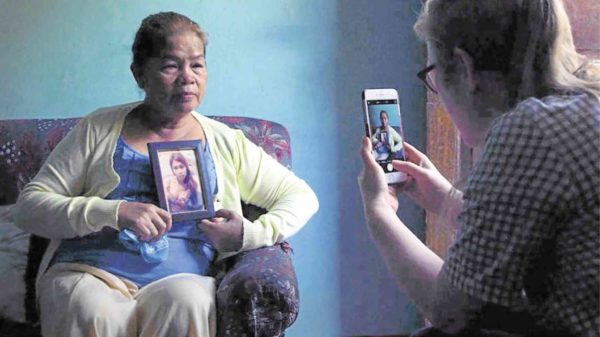Jennifer Laude film debuts in Tribeca
No, it’s not about that Ganda, the star of “Gandarrapiddo.”
The Ganda in the title of PJ Raval’s documentary “Call Her Ganda” refers to the nickname of slain transgender woman, Jennifer Laude.
“Beauty” was the term of endearment coined by Laude’s mom Julita, one of three unshakeable voices that resonate loudly in Raval’s docu, along with activist lawyer Virgie Suarez and transgender journalist Meredith Talusan.
Raval recalled that the responsibility of chronicling the life and death of Laude had fallen on his lap by chance.
In 2014, the US-based filmmaker visited his parents’ homeland, to screen his docus “Trinidad” and “Before You Know It” at the QC Pink LGBTQ+ Film Festival. It was a chance to reconnect with a country he had only visited as a child.
As luck would’ve it, his homecoming coincided with the feverish protests against the murder of Laude, a transwoman from Olongapo, in the hands of a US marine, Joseph Scott Pemberton.
At the festival, Raval found himself seated next to the Laude family’s lawyer, Suarez, in a panel on LGBTQ rights. When someone suggested that a docu on the case be made, “all eyes turned to me,” Raval recounted.
Three years later, the journey continues, with the docu, now titled “Call Her Ganda,” holding its world premiere at the prestigious Tribeca Film Festival in New York City recently.
From Tribeca, Raval’s film will have screenings at the Hot Docs, Canadian International Documentary Film Festival, ongoing in Toronto until May 6.
In his director’s notes, Raval explained that “being both queer and Filipino-American shaped who I am and how I experience the world.”
Needless to say, the director feels strongly about honoring “my intersectionality by presenting stories from both communities.”
The Hollywood Reporter’s Frank Scheck commended the docu: “Handling its complex issues and complicated plot developments with forceful clarity, the film proves simultaneously heartbreaking and inspirational.”
In the shadow of postcolonial realities and the ever-shifting tides of geopolitics, Laude’s brutalization became “a flash point for national discussion on gender-based violence and transgender discrimination,” said programmer Angie Driscoll in the Hot Docs web site.
Driscoll pointed out that the docu “forges a profoundly humanistic geopolitical investigative exposé from personal tragedy,” insisting “that justice and systemic change can’t come soon enough.”
“For anyone who has watched the documentary, it’s clear the court case is still very much unresolved,” Raval told the Inquirer. “Audiences not only need to be aware of the current situation, but it’s also crucial … to get involved now and demand action to be taken [if one wishes to see the outcome change].”
He described the docu as “a protest against the extreme violence and discrimination that transwomen face around the globe.” It is also “a tribute to the 3.4 million Filipinos living in the US” and other countries. He considers it a lesson on “the legacy of US imperialism in the Philippines,” as well.
Apart from Laude’s case, the docu also hopes to shed light on other instances of abuse and inequity. “We hope this film not only shows the relevance of the events that took place, but also make people aware of the events that continue to take place. As we all know, we are living in such dire times that we can’t afford to have issues overshadowed by more recent news stories,” Raval remarked.
In making the docu, he has realized that “any pursuit of justice for Jennifer … would not have been possible if it weren’t for the combined efforts of various activist community groups: trans rights, LGBTQ, women’s rights, and anti-US imperialist groups, to name a few.”
He hopes that “the film would show the need for marginalized groups to support one another. Racism, sexism, immigrant rights, gender-based violence, discrimination … are all examples of issues that affect us all regardless of what community you identify with.”
In conclusion, Raval quoted Naomi Fontanos, one of the transgender activists interviewed in the docu: “The fight for human rights for the trans community is a fight for justice for all.”

